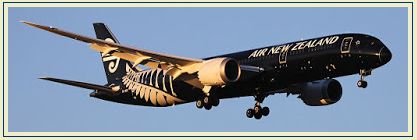Applicant Air New Zealand overcame a Section 2(e)(2) geographical descriptiveness refusal of AIR NZ for various air transportation services, convincing the Board to find acquired distinctiveness under Rule 2.141(a)(1) in view of applicant's ownership of a registration for AIR NEW ZEALAND for the same mark for the same or related services. The examining attorney unsuccessfully argued that, although NZ means NEW ZEALAND, it also has other meanings and therefore the two marks are not legally equivalent. In re Air New Zealand Ltd., Serial No. 79192386 (November 9, 2018) [not precedential] (Opinion by Judge David K. Heasley).

Applicant pointed out the incongruity in the Examining Attorney's position that, for purposes of the Section 2(d) refusal, the primary significance of 'NZ' is New Zealand, but as to the Section 2(f) claim, AIR NZ does not convey the same commercial impression as AIR NEW ZEALAND. Applicant argued that "[I]t is inconceivable that a consumer who comes across the Applicant's mark 'AIR NZ' is going to think of any other airline besides 'Air New Zealand' or any other airline company besides the Applicant."
Applicant's unconditional claim of acquired distinctiveness under Section 2(f), in response to the refusal to register, was a concession that its mark is primarily geographically descriptive of the services [or at lest a concession that it's not inherently distinctive - ed.].
Trademark Rule 2.41(a)(1) provides that "[i]n appropriate cases, ownership of one or more active prior registrations on the Principal Register . . . of the same mark may be accepted as prima facie evidence of distinctiveness if the goods or services are sufficiently similar to the goods or services in the application; however, further evidence may be required."
Applicant's registration for AIR NEW ZEALAND issued in 2012 based on acquired distinctiveness. Applicant maintained that AIR NZ and AIR NEW ENGLAND are legal equivalents. Under Rule 2.41, "same mark" does not mean "identical mark."
A proposed mark is the 'same mark' as a previously registered mark if it is the 'legal equivalent' of such mark," that is, "if it creates the same, continuing commercial impression such that the consumer would consider them both the same mark." In re Dial-A-Mattress, 57 USPQ2d at 1807, 1812 (Fed. Cir. 2001).
Applicant submitted various items of evidence, including dictionary definitions of "NZ," Google brand search engine results showing that a search for "NZ" yields the result "New Zealand, and evidence that NZ is the the country code for the New Zealand Internet top level domain.
The examining attorney contended that NZ can have other meanings: "An algebra book shows NZ means 'not zero,' The Neutral Zone is an online store and uses NZ to reference its website, and Sporting Charts shows NZ is used to explain neutral zone starts." He also pooh-poohed applicant's evidence, claiming that it did not show how consumers will interpret "NZ" in connection with airline services.
The Board noted that the two marks are highly descriptive, and so the Section 2(f) hurdle is "commensurately high." There was no dispute that applicant's prior registration and current application "recite essentially the same airline services," i.e., they are "sufficiently similar." The issue was "whether consumers of those same airline services would view AIR NZ as conveying the same, continuing commercial impression." The Board found that they would.
"[N]icknames and even abbreviations and maps of geographical areas and the name of the geographical area that they identify are, for purposes of registration, identical, and . . . the same criteria for registration must necessarily apply thereto." In re Charles S. Loeb Pipes, Inc., 190 USPQ 238, 246 (TTAB 1975) (emphasis added by the Board).
Applicant's mark must be viewed in the context of airline services; the alternative meanings proposed by the examining attorney are not probative. "Taken as a whole, AIR NZ retains the same structure as AIR NEW ZEALAND, a structure consumers would tend to recognize and associate with Applicant."
And given the consuming public's penchant for shortening place names, see In re South Park Cigar Inc., 82 USPQ2d 1507, 1512 (TTAB 2007), Applicant's contraction of the country name NEW ZEALAND into the initialism NZ neither adds nor subtracts anything to or from the origin-indicating significance of AIR NEW ZEALAND. The relevant public would tend to view AIR NZ as a shorthand version of the original mark.
Conclusion: The Board found that AIR NZ is the legal equivalent of AIR NEW ZEALAND, and further that AIR NZ has acquired distinctiveness by virtue of Applicant's prior active registration of AIR NEW ZEALAND. "Because it has acquired distinctiveness, the mark AIR NZ no longer causes the public to associate the services with a particular place, but to associate them with a particular source."
Therefore the Board affirmed the Section 2(e)(2) refusal but "the refusal on the ground that it has not acquired distinctiveness under Section 2(f) is reversed."
TTABlog comment: I disagree with the wording of the Board's conclusion. Section 2(f) is not a ground for refusal. Section 2(f) allows an applicant to overcome a refusal, such as geographical descriptivenes. So marks may be registered "under" Section 2(f) but they can't be refused under Section 2(f).
The content of this article is intended to provide a general guide to the subject matter. Specialist advice should be sought about your specific circumstances.
